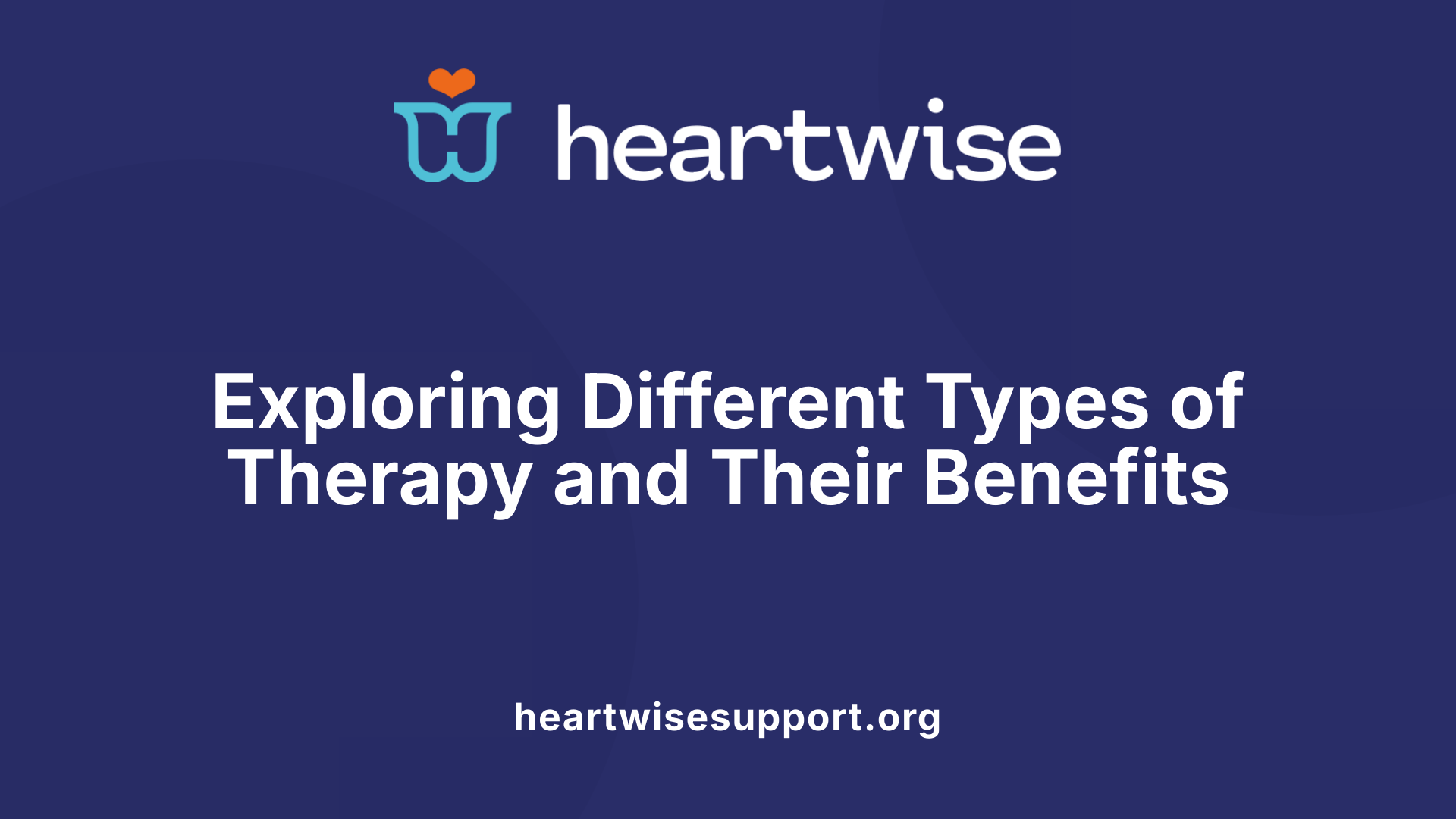Understanding the Role of Therapy in Emotional and Mental Wellbeing
Therapy is a systematic and evidence-based approach to nurturing emotional health, helping individuals explore their feelings, thoughts, and behaviors with the guidance of trained professionals. It offers a safe space to address stress, anxiety, depression, and other mental health challenges while fostering resilience and personal growth. This article delves into the various therapies available, the benefits they provide, what to expect during sessions, and how to select the right support to enhance emotional wellbeing.
The Foundations and Goals of Therapy

What is therapy and how does it work?
Therapy, often called psychotherapy or talk therapy, is a structured approach to addressing emotional and psychological issues. It involves working with a trained professional to explore feelings, thoughts, and behaviors, aiming to understand and manage internal struggles. This process can take place in individual, group, couples, or family settings, both in person and online.
Therapy helps build self-awareness, emotional regulation, and resilience. It provides a safe, supportive space where individuals can openly express emotions and gain insights into their mental health. Different types of therapy, such as Cognitive Behavioral Therapy (CBT), Mindfulness-Based Therapy, Psychoanalytic Therapy, and Interpersonal Therapy (IPT), utilize various techniques to suit individual needs.
Goals of therapy: relief, growth, and improved functioning
The main goals of therapy include alleviating symptoms like anxiety and depression, improving daily functioning, and promoting personal growth. It also aims to enhance relationships by improving communication skills and resolving conflicts. Many individuals seek therapy for emotional resilience, better self-confidence, and developing effective coping strategies.
Successful therapy can lead to long-term benefits such as stronger relationships, improved problem-solving skills, and increased overall life satisfaction. It’s a proactive form of self-care that supports emotional well-being and personal development.
How does therapy support emotional wellbeing?
Therapy provides a structured environment where individuals can explore their feelings and develop healthier coping mechanisms. Techniques like cognitive restructuring help challenge negative thought patterns, replacing them with balanced perspectives.
Supportive therapy can help people manage stress, grief, or trauma, guiding them through processes like mindfulness, relaxation exercises, and emotional regulation skills.
Engaging in activities such as journaling, art therapy, or creative outlets during therapy further aids in emotional expression and healing. These methods allow individuals to process difficult emotions in various ways, promoting resilience and psychological balance.
Effective ways to cope with stress and emotional challenges
Coping with stress involves a mixture of strategies. Managing difficult emotions through mindfulness, journaling, or creative outlets like art and music plays a significant role. Building strong, supportive relationships and connecting with community help reinforce emotional resilience.
Practicing relaxation techniques such as yoga, meditation, deep breathing, and ensuring good sleep are crucial for stress reduction. Physical activity, like walking or sports, also boosts mood and distracts from stressors.
Focusing on gratitude, reframing problems, and accepting what cannot be changed enhance mental strength. Time management, goal-setting, taking breaks, and engaging in enjoyable activities support a balanced emotional life.
How can therapy support emotional wellbeing?
Therapy actively supports emotional health by helping individuals deepen self-awareness and regulate emotions more effectively. It offers tools to challenge negative thought patterns and promote positive thinking.
Through therapy, clients learn to better communicate and resolve conflicts, which are essential for maintaining healthy relationships. Techniques like deep breathing, mindfulness, and relaxation exercises help reduce stress and anxiety.
Furthermore, therapy fosters resilience, empowering individuals to cope with life’s challenges, whether they involve trauma, loss, or everyday stressors. Ultimately, it promotes psychological balance, encourages personal growth, and enhances overall life quality.
Exploring different types of therapy
Various therapies cater to different needs:
| Type of Therapy | Focus Area | Support Strategies | Typical Use Cases |
|---|---|---|---|
| CBT | Thought and behavior change | Challenging negative thoughts, behavioral modification | Anxiety, depression, phobias |
| Mindfulness-Based | Present-moment awareness | Meditation, breathing exercises | Stress reduction, emotional regulation |
| Psychoanalytic | Unconscious thoughts | Exploring past experiences | Deep-seated emotional issues |
| Interpersonal (IPT) | Relationship skills | Communication and conflict resolution | Relationship difficulties, depression |
| Art Therapy | Creative expression | Drawing, painting, creative projects | Trauma, emotional expression |
| EMDR | Trauma processing | Eye movements, desensitization | PTSD, trauma recovery |
These varied approaches provide tailored support, addressing specific emotional and psychological challenges.
Making therapy effective
Finding the right therapist involves considering professional qualifications, approach compatibility, and comfort level. Having open communication and establishing trust are essential for success.
Setting clear goals and committing to ongoing sessions can foster progress. Integrating learned skills into daily life ensures sustained benefits.
Therapy is a proactive, evidence-based tool that supports emotional wellbeing, personal growth, and resilience, making it an important part of overall health care.
Different Types of Therapeutic Approaches and Methods
What are the different types of therapeutic approaches and methods?
There is a wide variety of therapeutic methods available, each with its own focus and techniques. Common approaches include cognitive-behavioral therapy (CBT), psychodynamic or psychoanalytic therapy, mindfulness-based therapy, interpersonal therapy (IPT), eye movement desensitization and reprocessing (EMDR), internal family systems (IFS), and art therapy, among others.
Each modality aims to address different aspects of emotional and psychological well-being. For example, CBT is action-oriented, helping individuals change negative thought patterns and behaviors. Psychodynamic therapy dives into unconscious influences from past experiences that shape current feelings and relationships. Mindfulness-based therapies teach present-moment awareness to reduce stress and improve emotional balance. EMDR is notably effective in trauma treatment, facilitating processing of traumatic memories. IFS explores internal parts of the self to foster harmony and self-understanding, while art therapy uses creative expression to unlock emotions.
In addition to these, there are therapies tailored for specific individuals or conditions, such as family and couples therapy, group therapy, animal-assisted therapy, and more. The choice of therapy depends on the person’s symptoms, preferences, and the professional’s recommendation.
Goals and techniques associated with each approach
| Therapy Type | Main Goals | Techniques Involved | Suited For |
|---|---|---|---|
| Cognitive Behavioral Therapy (CBT) | Reduce symptoms, change negative thoughts, improve coping | Thought records, behavioral experiments, cognitive restructuring | Anxiety, depression, OCD, phobias |
| Psychodynamic Therapy | Uncover unconscious patterns, resolve past conflicts | Free association, dream analysis, exploration of childhood influences | Complex emotional issues, personality disorders |
| Mindfulness-Based Therapy | Enhance emotional regulation, reduce stress | Meditation, body scans, mindful breathing | Stress, anxiety, depression |
| Interpersonal Therapy (IPT) | Improve communication and relationships | Role playing, social skill training, addressing relationship issues | Depression, relationship conflicts |
| EMDR | Process traumatic memories, reduce emotional distress | Bilateral stimulation, guided recall | PTSD, trauma recovery |
| IFS | Promote internal harmony, self-awareness | Exploring internal parts, self-leadership | Trauma, internal conflicts |
| Art Therapy | Express emotions creatively, enhance self-awareness | Drawing, painting, sculpture | Trauma, emotional regulation issues |
Conditions each therapy is suited for
Different therapies target specific mental health issues:
- CBT is highly effective for anxiety, depression, OCD, and phobias.
- Psychoanalytic and psychodynamic therapies help with complex emotional problems, personality issues, and unresolved childhood conflicts.
- Mindfulness-based approaches support stress reduction, emotional regulation, and managing depression or anxiety.
- Interpersonal therapy (IPT) is beneficial for depression, especially related to relationship problems.
- EMDR is a preferred treatment for trauma and post-traumatic stress disorder.
- Art therapy and expressive therapies help with trauma, grief, and emotional repression.
- Family and couples therapy aim to improve communication, resolve conflicts, and strengthen relationships.
- Group therapy provides social support and shared healing opportunities for various conditions.
How do different therapies help in emotional regulation?
Various therapeutic modalities offer specific techniques to enhance emotional management. Cognitive-behavioral therapy (CBT), for example, helps individuals identify and challenge negative thought patterns that trigger intense emotions, replacing them with healthier beliefs. Dialectical behavior therapy (DBT), a derivative of CBT, employs mindfulness and distress tolerance skills to cope with emotional crises more effectively.
EMDR enables clients to process traumatic memories that cause emotional reactivity, reducing the intensity of responses over time. Psychodynamic therapy uncovers unconscious motivations that influence feelings, leading to better self-understanding and emotional stability. Creative approaches like art therapy foster non-verbal expression and present-moment awareness, helping clients gain control over their emotional states.
Tailoring therapy to individual needs ensures the best chances for developing emotional regulation skills, resilience, and overall emotional well-being.
Choosing the Right Therapist and Support System
How do I choose the right therapist or mental health support?
Selecting a mental health professional is a vital step in your journey toward emotional well-being. The process involves careful evaluation of several factors to ensure you find someone who is a good fit for your specific needs.
Begin by verifying their qualifications. Licensed professionals such as psychologists, psychiatrists, social workers, or licensed counselors have completed rigorous training and adhere to ethical standards. You should also inquire about their experience, especially in treating issues similar to yours, and their familiarity with evidence-based therapies like cognitive-behavioral therapy (CBT) or EMDR.
Having a consultation session is highly recommended. During this initial meeting, you can discuss your goals, ask about their therapeutic approach, and get a sense of the interaction style. Compatibility and comfort are critical—your therapist should create a safe, non-judgmental space where you feel understood and respected.
Practical considerations also play a significant role. Consider session costs, whether they accept your insurance, and their availability or scheduling flexibility. Accessibility might include in-person or online sessions, which can provide convenience and broader options.
Trusting your instincts matters, too. Find a therapist with whom you feel comfortable establishing a rapport. The successful therapy relationship depends heavily on mutual trust, openness, and feeling safe to explore sensitive topics.
What should I look for in mental health support?
When seeking support, it’s important to choose licensed and experienced professionals such as psychologists, psychiatrists, or licensed counselors. Look into their specialization and therapeutic approach to see if it aligns with your needs.
Personal comfort and compatibility are key; you should feel safe and able to communicate openly with your chosen support person. This openness allows for honest discussions and more effective therapy.
Assess practical details such as their availability, whether they offer online sessions if needed, and affordability, especially in relation to your insurance coverage. Researching their reputation through reviews, or seeking recommendations, can also help you feel confident in your decision.
Ultimately, the support system you build should be tailored to your personal preferences and circumstances, fostering a sense of trust and hope as you work toward emotional health.
Additional Resources and Tips
Further guidance on selecting a mental health professional can be found through resources like the Substance Abuse and Mental Health Services Administration (SAMHSA) or national psychological associations. These organizations provide comprehensive guidelines and tips for evaluating and choosing providers.
By thoroughly researching, consulting, and trusting your instincts, you can find the right support system that empowers you on your path to emotional resilience and overall wellness.
Supporting Emotional Wellbeing in Daily Life
How can I support someone's emotional well-being?
Supporting someone’s emotional health is a vital way to help them navigate life's challenges. It begins with active listening—being present, non-judgmental, and offering reassurance helps individuals feel heard and understood. Encouraging practices like mindfulness and relaxation techniques can boost their mood and resilience.
Connecting them with their social support networks and fostering positive relationships promotes a sense of belonging and self-worth. Acts of kindness, like giving or volunteering, also reinforce feelings of purpose and community engagement.
Moreover, guiding them towards effective coping strategies such as journaling, learning new skills, or engaging in creative activities like art therapy can be empowering. Recognizing when professional help is needed is equally important; suggesting counseling or mental health resources ensures they receive appropriate support.
In summary, supporting well-being involves a combination of emotional presence, encouragement of healthy habits, and facilitating access to additional help when necessary.
What can I do to help manage my stress?
Managing personal stress is essential for maintaining overall emotional and physical health. Incorporating relaxation techniques into your daily routine can significantly reduce feelings of overwhelm. Practices such as deep breathing exercises, meditation, or yoga are simple yet effective tools to calm the mind.
Regular physical activity not only boosts mood but also lowers anxiety levels. Whether it’s walking, cycling, or engaging in sports, movement helps release stress and promotes better sleep.
Prioritizing sleep hygiene, such as sticking to consistent sleep schedules and reducing screen time before bed, enhances restorative rest. Maintaining balanced nutrition and staying hydrated support your body’s resilience.
Setting healthy boundaries and learning to say no prevent burnout, while mindfulness helps you stay present and manage intense emotions. Building a support network of friends, family, or support groups provides emotional backup.
Finally, engaging in hobbies and activities you enjoy can serve as positive outlets for stress. Remember, practicing self-care isn't a one-time event but an ongoing commitment to your mental health.
The importance of sleep, nutrition, and physical activity
A balanced approach to health includes adequate sleep, proper nutrition, and regular physical activity—cornerstones of emotional wellbeing. Sleep is crucial; quality rest helps regulate mood and cognitive function. Nutritional choices, favoring whole foods rich in vitamins and minerals, support brain health and energy levels.
Physical activity, released endorphins and reduces stress hormones like cortisol, which can negatively impact health when chronically elevated. Incorporating movement into daily routines enhances mood, improves sleep quality, and boosts self-esteem.
Together, these habits create a foundation that nurtures mental resilience, reduces the risk of emotional disturbances, and promotes long-term health.
Enhancing relationships and social connections
Strong relationships and social support are protective factors for mental health. Investing time in building and maintaining meaningful connections fosters emotional stability and provides outlets for sharing feelings.
Effective communication skills, such as active listening and assertive expression, improve relationship quality. Setting healthy boundaries ensures respect and mutual understanding.
Participating in group activities, family gatherings, or community events encourages a sense of belonging.
Therapy—whether individual, couples, or family—can further deepen understanding and strengthen bonds. Social connections not only offer emotional support but also enhance overall life satisfaction.
Practicing gratitude and positive mindset strategies
Cultivating a positive outlook involves routinely practicing gratitude and reframe negative thoughts. Keeping a gratitude journal—acknowledging daily blessings—shifts focus towards positive aspects of life, improving emotional resilience.
Adopting a growth mindset, where setbacks are viewed as opportunities to learn, enhances confidence and motivates personal development. Regularly engaging in mindfulness and self-compassion exercises helps foster kindness towards oneself.
These practices promote a more optimistic outlook, reduce stress, and increase overall happiness and satisfaction.
| Aspect | Suggested Practice | Benefits | Tips |
|---|---|---|---|
| Emotional support | Active listening, reassurance | Builds trust, reduces feelings of isolation | Be patient, show empathy |
| Stress reduction | Deep breathing, meditation, yoga | Calms nervous system, improves mood | Practice daily, start with short sessions |
| Sleep hygiene | Consistent schedule, limit screens | Enhances mood, cognitive function | Create relaxing bedtime routines |
| Physical activity | Walking, sports, dance | Releases endorphins, reduces anxiety | Find enjoyable activities |
| Nutrition | Balanced, nutrient-rich foods | Supports brain health, energy | Limit processed foods |
| Relationships | Quality time, communication | Fosters trust, emotional stability | Prioritize meaningful interactions |
| Positive mindset | Gratitude journaling, affirmations | Increases happiness, resilience | Practice consistently |
Supporting emotional wellness requires a holistic approach—balancing mental health practices with lifestyle habits ensures lasting benefits. Regularly engaging in these activities builds a foundation for resilience, personal growth, and healthier relationships, making emotional wellbeing an attainable everyday goal.
The Impact of Therapy on Physical and Emotional Health
What are the benefits of therapy for emotional health and mental well-being?
Therapy plays a crucial role in enhancing emotional and mental health. It helps individuals understand, regulate, and manage their emotions, thoughts, and behaviors more effectively. Through evidence-based approaches such as Cognitive Behavioral Therapy (CBT) and Dialectical Behavior Therapy (DBT), clients often experience relief from symptoms of depression, anxiety, and other mental health conditions.
Therapy not only alleviates psychological symptoms but also improves communication and relationship skills. This fosters healthier relationships and stronger support systems, which are essential for emotional resilience.
Beyond mental health, therapy contributes to physical well-being by reducing stress, improving sleep patterns, and bolstering immune function. It offers a safe, supportive environment for exploring personal concerns, developing coping strategies, and building resilience—factors that significantly bolster emotional and overall well-being.
In summary, therapy is a comprehensive tool for promoting mental stability, emotional regulation, and physical health, supporting a higher quality of life.
How does emotional wellbeing affect physical health?
Emotional wellbeing has a deep influence on physical health, intertwining mind and body. Chronic stress, characterized by persistent feelings of overwhelm and anxiety, triggers the release of hormones such as cortisol. Elevated cortisol levels can suppress the immune system, making the body more susceptible to illnesses.
Moreover, chronic stress contributes to increased blood pressure, inflammation, and a higher risk of cardiovascular diseases and diabetes. These adverse effects highlight the importance of managing stress and maintaining emotional stability.
Positive emotions and emotional resilience strengthen the immune system, enhance sleep quality, and reduce inflammation, thereby promoting physical health. The gut-brain connection further exemplifies this link, where emotional states can influence digestive health, impacting conditions like Irritable Bowel Syndrome (IBS) and reflux.
Maintaining emotional wellbeing through therapy, relaxation techniques, and healthy lifestyle choices supports better physical health outcomes. Recognizing the interconnectedness of emotional and physical health underscores the significance of holistic self-care.
Effects of chronic stress on health: cortisol, immune function
Chronic stress prompts the body to produce excessive cortisol, a hormone intended for short-term survival responses. When stress persists, this hormone can impair immune function, reducing the body's ability to fight off infections and heal wounds.
High cortisol levels also contribute to increased blood pressure and inflammation, which are linked to heart disease and other chronic conditions. Over time, prolonged stress and elevated cortisol can lead to fatigue, depression, and metabolic disturbances.
Managing stress through therapy, mindfulness, and relaxation activities helps regulate cortisol levels, supporting immune function and overall health.
Physical benefits of reduced stress: sleep, immune response, heart health
Lowering stress through therapeutic practices and lifestyle adjustments offers measurable physical health benefits. Improved sleep quality is a primary advantage, as restful sleep helps repair tissues, regulate hormones, and strengthen immunity.
An enhanced immune response reduces susceptibility to infections, promoting quicker recoveries and fewer illnesses.
Additionally, relaxation techniques such as deep breathing, meditation, and mindfulness improve heart health by lowering blood pressure and reducing the strain on cardiovascular systems.
These holistic benefits demonstrate how emotional balance directly fosters physical resilience, underscoring therapy's role in comprehensive health.
The gut-brain connection and its role in emotional wellbeing
The gut-brain axis signifies a bidirectional communication pathway between the digestive system and the brain. Emotional states can influence gut health, affecting digestion, nutrient absorption, and symptoms like reflux and IBS.
Stress and anxiety often exacerbate digestive issues, creating a cycle that impacts both emotional and physical health. Conversely, a balanced emotional state can promote better gut health.
Therapeutic approaches that reduce stress and promote relaxation—such as mindfulness and art therapy—can improve gut functioning. Addressing emotional health therefore plays a vital role in managing digestive disorders.
| Aspect | Effect | How Therapy Helps |
|---|---|---|
| Emotional regulation | Reduces anxiety, depression, mood swings | Developing coping skills and emotional awareness |
| Stress management | Lowers cortisol, improves sleep | Relaxation techniques, mindfulness training |
| Relationship health | Improves communication and conflict resolution | Couples and family therapy |
| Physical health | Boosts immunity, reduces inflammation, supports heart health | Stress reduction, lifestyle changes, emotional support |
| Brain-gut health | Eases digestion, reduces IBS symptoms | Mindfulness, stress management techniques |
Understanding the interconnection between emotional wellbeing and physical health emphasizes the importance of holistic care. Engaging in therapy and adopting healthy habits can improve overall health, leading to a more balanced, resilient life.
Prioritizing Emotional Wellness Through Therapy
Supporting emotional wellbeing through therapy is a proactive, empowering step toward a healthier, more resilient life. By engaging with appropriate therapeutic approaches, individuals can develop vital coping skills, foster self-awareness, and strengthen relationships. Whether addressing specific mental health concerns or seeking personal growth, therapy offers a safe and effective pathway to emotional resilience and overall wellness. Taking the first step to connect with a qualified professional can lead to meaningful, long-lasting benefits, underscoring the importance of mental health as an integral part of overall wellbeing.
References
- Emotional Well-Being Support Through Therapy
- How Therapy Can Improve Mental Health - Manhattan Psychology ...
- Discover the Benefits of Therapy for Mental Health - CNS Healthcare
- Emotional Wellness Toolkit — More Resources
- Benefits of talking therapies - NHS
- Why Psychotherapy is Essential for Emotional Wellbeing
- How to Improve Your Emotional Well-Being Through Therapy
- Psychotherapies - National Institute of Mental Health (NIMH)
- Therapy | Mental Health America
- Therapy as a Pathway to Better Emotional Health











